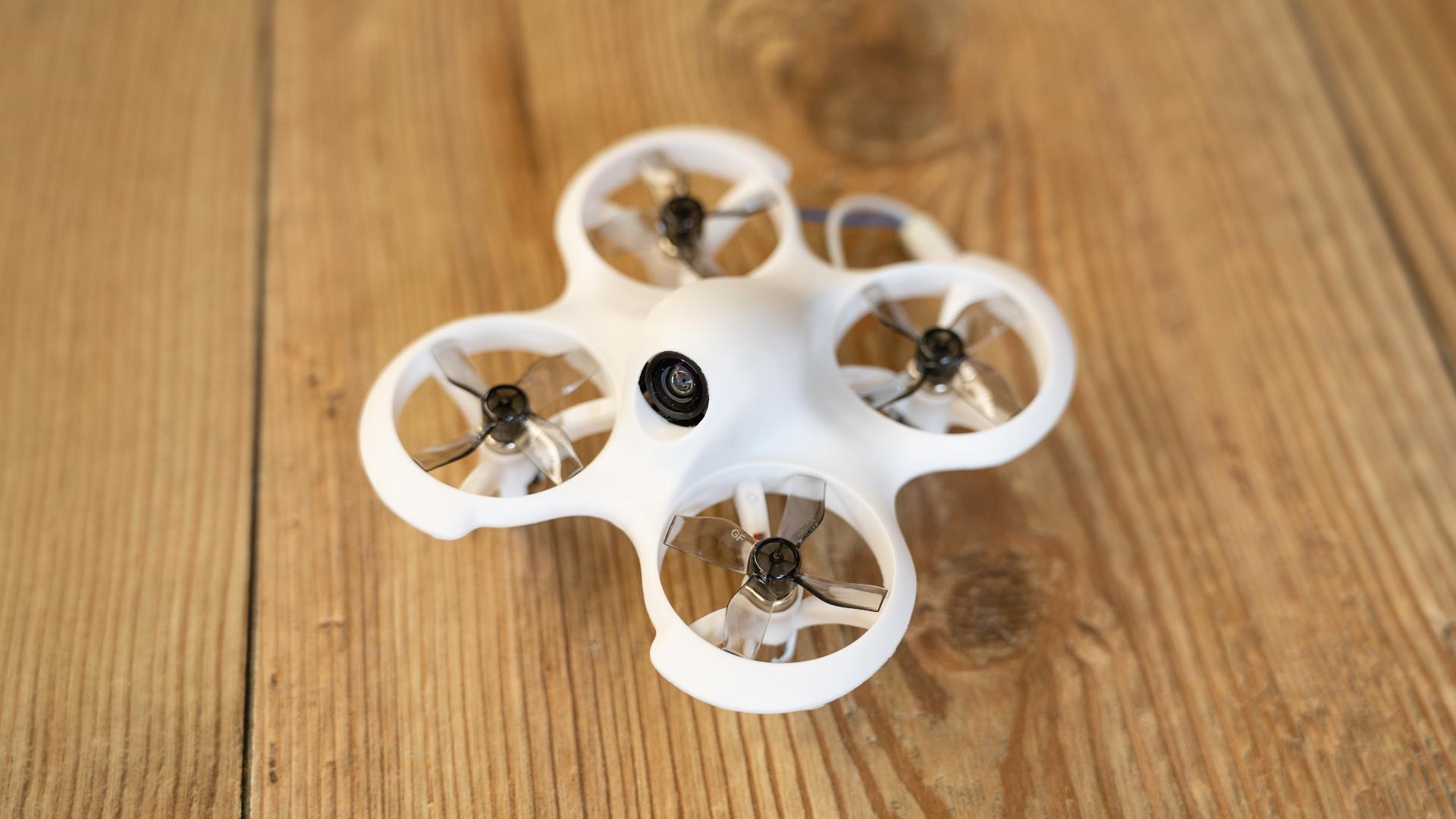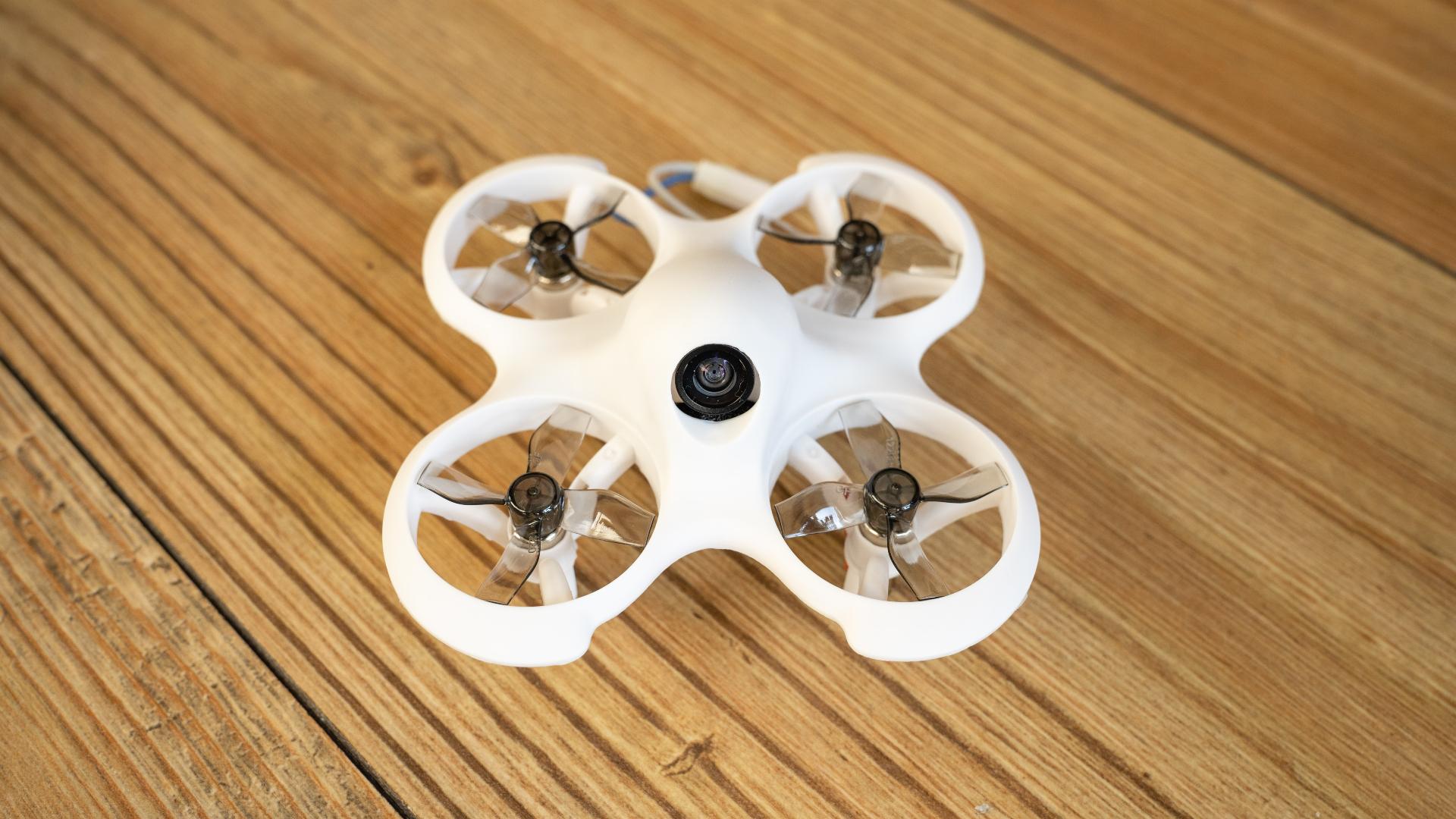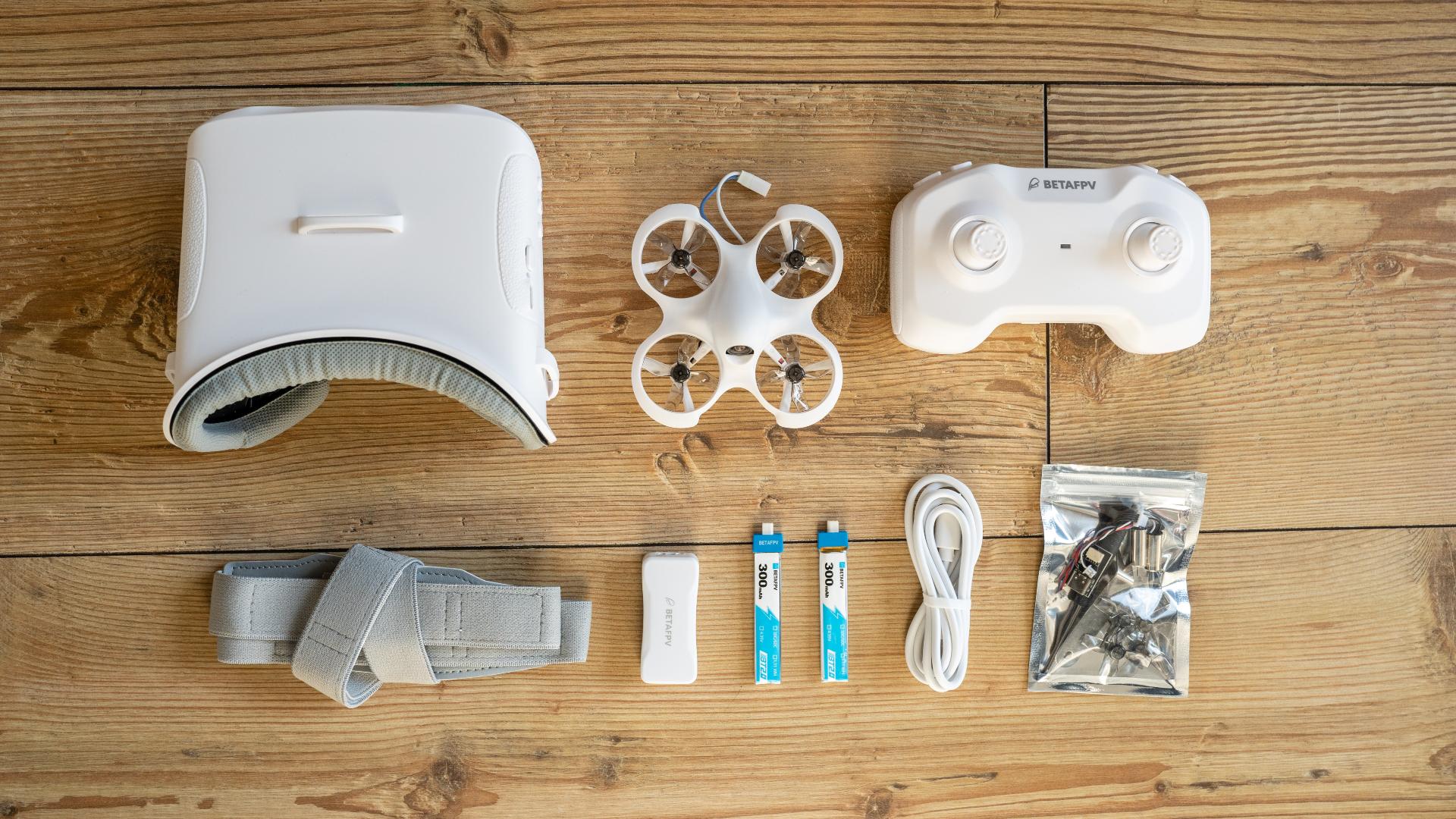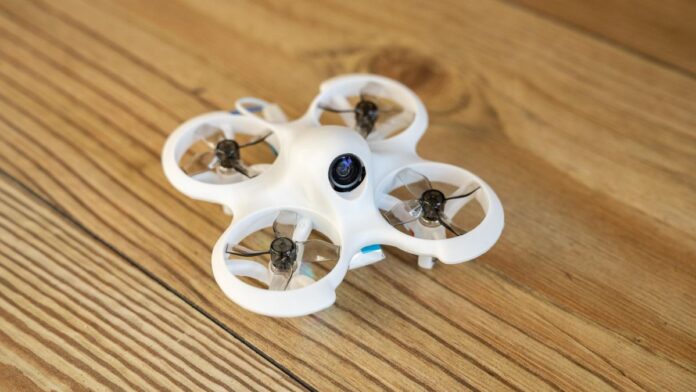Key specs:
Weight: 1.26 oz/36 g (including battery)
Dimensions: 3.54 x 3.34 x 1.77 in/90 x 85 x 45 mm
Battery: BT2.0 300 mAh LiPo 1S 30C / up to 5 minutes
Charger type: BT2.0 USB Battery Charger and Voltage Tester
Modes: Level Mode with Slow and Fast speeds
Video transmission range: Up to 80 m
Video resolution: No video or photo capture available
Safety features: Altitude hold (hover) / Emergency Auto Locking (disarms motors after collisions)
Getting started in FPV drone flight is easier than ever before thanks to ready-to-fly kits like the BetaFPV Cetus Lite FPV Kit as they remove the complexity and cost of building FPV drones from scratch. BetaFPV is one of the leading manufacturers of the best FPV drone (opens in new tab) kits for beginners and more advanced pilots alike, and the Chinese company’s Cetus Lite FPV Kit offers the easiest flights possible with an FPV-style drone.
The BetaFPV Cetus Lite FPV Kit is aimed at absolute beginners and even children because of how easy it is to fly. The drone can hover and the left control stick on the transmitter/controller centers when released to aid with this functionality. This is completely different to standard FPV controllers where the left throttle stick needs to be regulated, a little like an accelerator in a car, to maintain flight. Plus, traditional FPV drones, including BetaFPV’s own more advanced models, are much easier to crash but much more exciting to fly.
The hover functionality makes flying a basic FPV drone easier than ever before. Cetus Lite offers a single flight mode which is a great way to get used to using FPV goggles or for children interested in drones. However, this does mean that making progression impossible as your confidence grows.
If you’re interested in drones in general than you’ll find our guides to the best beginner drones and best drones useful. Plus, we have a great drone deals hub to help you snag a drone for the best price.
BetaFPV Cetus Lite FPV Kit review: Design
- Extremely small and lightweight
- Box-type FPV goggles included
- Controller is small, basic, and toy-like
The Cetus Lite Brushed Quadcopter is incredibly small and lightweight at 1.26 oz/36 g (that’s including a 300 mAh 1S LiPo battery). Maximum flight times are advertised at 4-5 minutes and during our testing flights were typically around the 3-minute mark – note that this was in winter but indoors, so we’d expect during the warmer summer months that longer flight times could be possible.
The Cetus Lite airframe is made of robust PA12 plastic with built-in propeller guards around and below the propellers to make it safe to fly indoors and around people. The airframe can withstand the majority of crashes, while the small size and light weight of the drone means that it’s unlikely to cause damage, although care still needs to be taken.
The motors are brushed and protrude below the propellers within the airframe, but this causes no issues in terms of design and build quality. They deliver less power than their brushless counterparts, which isn’t a problem for indoor flying, but outdoors the drone could struggle or even get blown away in light winds. If you did decide to venture outdoors with the Cetus Lite and it began to get swept away by a gust, pressing the Arm button on the controller will stop the motors and make the drone drop to the ground.
The LiteRadio 1 controller that comes in the kit is BetaFPV’s entry-level model, which includes self-centering control sticks rather than the left throttle stick being non-centering like most FPV controllers. The controller has more buttons than required for the Cetus Lite, with just the Arm button to start and stop the motors, the speed button, and the control sticks being used during flights. The controller and VTX (video feed) are claimed to work up to 80 m, but it’s best to keep the Cetus Lite within 25 m to avoid connection issues.
The controller is small and lightweight, making it ideal for use by children. Plus, while it comes fitted with 10 mm thumb sticks, there’s also a pair of 16 mm sticks in the kit that can be swapped if you prefer to pinch control sticks between your thumbs and forefingers instead of using just your thumbs. The controller can also be used with FPV flight simulators connected to a PC via USB-C, so you can extend your flying in more advanced flight modes this way if you wish. However, with the self-centering throttle stick the flight experience would be awkward and unrealistic compared to a true FPV controller.
The goggles included in the kit are the BetaFPV VR02 FPV Goggles. These are fairly basic, but they’re easy to use and work well with the Cetus Lite. Although during testing we did find that the goggles had to be set to scan mode every time the drone was powered up to make a connection with the drone’s VTX to receive the FPV feed. This involves pressing the ‘S’ button on the side of the goggles and only takes a few seconds to connect.
BetaFPV Cetus Lite FPV Kit review: Functionality

- Only one flight mode and two speeds
- Hover function for easy flying
- Motors power off automatically in collisions
One of the most attractive aspects of the Cetus Lite FPV Kit is its pure simplicity combined with a handful of safety features that make flights unbelievably easy for even absolute beginners. Some of these mean that you could outgrow the kit fairly quickly, which we’ll discuss later, but as previously mentioned the ease of flight means that you can concentrate on getting used to using FPV goggles.
Using FPV goggles like these can be a strange experience at first. This is a result of the quality of the analogue video feed, the size of the image in the goggles, and not having the spatial awareness when using them to accurately judge and avoid obstacles. Like with everything, as your experience grows, so does your confidence and ability, which is why the Cetus Lite Kit is a useful tool for getting used to this aspect of FPV flight as it’s a slow and easy to fly drone.
In terms of safety and features that make flight simpler than standard micro whoops, the Cetus Lite has a couple of tricks up its sleeve. For one, the hover function means the drone will simply stop and hover when the control sticks are released. And, when a crash is detected by the 6-axis IMU (Inertial Measurement Unit) sensor, Emergency Auto Locking automatically disarms the motors.
Another way that flying is kept easy is simply because the Cetus Lite has just one flight mode – Level. In this mode the drone automatically levels when the control sticks are released, and it can’t be flipped or rolled like you can when flying in manual flight modes. Then there are two flight speeds, Slow and Fast, which are both pretty sedate and well suited to flight within a home environment.
Now, the advantage of this is the ease of use, but the disadvantage is that you’re limited to a single flight mode and can’t progress as you gain flight confidence and experience like you can with the Cetus Pro and Cetus X (opens in new tab) models.
All in all, the features on offer match the target audience of the drone by keeping everything as simple as possible. The ability to progress with Angle Mode and Acro Mode would be a welcome feature, but these are available with the three more advanced Cetus models, so it’s understandable why they’re absent from the Cetus Lite with its lower price.
BetaFPV Cetus Lite FPV Kit review: Price

The Cetus Lite Kit costs just $120/£101 (opens in new tab) when purchased direct from BetaFPV. You can also purchase the kit from Amazon, which includes faster shipping but the cost rises to $143 (opens in new tab)/£147 (opens in new tab).The kit includes everything you need to get started, so all you have to do is charge the controller, FPV goggles, and drone batteries and you’re ready to fly.
The kit includes a Cetus Lite Brushed Whoop Quadcopter, a LiteRadio 1 Transmitter, VR02 FPV Goggles, two batteries, an additional set of tall controller thumb sticks, a USB battery charger and cable, four spare propellers, a screwdriver, a propeller removal tool, and a USB-C adaptor for firmware updates. You can also purchase additional batteries and a six-port battery charger separately if you would like to extend flight times between charges.
Should you buy the BetaFPV Cetus Lite FPV Kit?

If you would like to try flying FPV drones with an inexpensive, easy-to-fly kit, then the Cetus Lite FPV Kit is a great option. The only downside is that the drone only uses the Level flight mode so you can’t try other more exciting flight modes as your confidence grows, so you will need to upgrade to a more advanced FPV drone kit reasonably quickly. It would also make an inexpensive gift for children who are interested in drones since it’s essentially a toy.
That said, one of the great advantages of the Cetus Lite is just how easy it is to fly for absolute beginners. This has the advantage of allowing you to get used to FPV goggles before trying to fly a faster micro whoop FPV drone in one of the more difficult-to-use flight modes. Using FPV goggles feels strange at first, so for this alone the Cetus Lite FPV Kit is an interesting option.
If the BetaFPV Cetus Lite FPV Kit isn’t for you
If you’re reading this, you’re likely interested in getting started with flying FPV drones. But if the idea of an FPV drone kit that you know you’ll fairly quickly outgrow puts you off, there are two more advanced Cetus kits you could consider that will provide more longevity. There are faster and more powerful drones offering additional flight modes, including Acro for more exciting flights.
The BetaFPV Cetus Pro Kit (opens in new tab) is the mid-range option complete with everything you need to get started and costs $230/£194 (opens in new tab). This drone can hold its position, although it’s more difficult to fly than the Cetus Lite.
There’s also the top-of-the-range Cetus X FPV Kit (opens in new tab). This comes with everything you need to get started, including goggles that can record the camera feed to a microSD card as well as a more advanced BetaFPV LiteRadio 3 controller. There are two versions available, and the option that features position hold is the Cetus FC version which costs $310/£262 (opens in new tab).
We’ve also got a list of the best FPV drones divided into different sections to help you find the best model for you.


